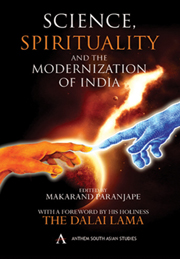Book contents
- Frontmatter
- Contents
- Notes on Contributors
- Foreword
- Editor's Preface
- I Science and Spirituality: East and West
- II Coming to Terms with Science: Some Change Agents
- III Building Bridges: Evolution, Consciousness and Healing
- IV Science and Spirituality: Culture, Society and Gender
- CHAPTER 13 Faith outside the Lab
- CHAPTER 14 The Calling of Practical Spirituality
CHAPTER 14 - The Calling of Practical Spirituality
from IV - Science and Spirituality: Culture, Society and Gender
Published online by Cambridge University Press: 05 March 2012
- Frontmatter
- Contents
- Notes on Contributors
- Foreword
- Editor's Preface
- I Science and Spirituality: East and West
- II Coming to Terms with Science: Some Change Agents
- III Building Bridges: Evolution, Consciousness and Healing
- IV Science and Spirituality: Culture, Society and Gender
- CHAPTER 13 Faith outside the Lab
- CHAPTER 14 The Calling of Practical Spirituality
Summary
Today we are so impressed with the progress of the physical sciences – originally derived from metaphysics – that we return the complement and derive our metaphysics from natural sciences. But the scientific worldview has its own metaphysical presuppositions which originated in ancient Greece in way of looking at the world that came to fruition in Plato and especially Aristotle. This dualistic view stands almost in dramatic opposition to a worldview based on the nonduality of the seer and the seen.
David Loy, 1988, Nonduality: A Study in Comparative Philosophy, p.12.It is only a slight exaggeration to say that the artists have increasingly become the spiritual leaders of our time. Artists are sometimes among the few who take time to reflect on the deeper meaning of life and to search for ways to express both the turmoil of their search and the tentative insights they have gained. They usually have more questions than answers, yet their work celebrates wholeness and coherence as well as bewilderness and mystery.
Robert Wuthnow, 2001, Creative Spirituality: The Way of the Artist, p.266.God calls on us to be his partners to work for a new kind of society where people count; where people matter more than things, more than possessions; where human life is not just respected but positively revered; where people will be secure and not suffer from the fear of hunger, from ignorance, from disease where there will be more gentleness, more caring, more sharing, more compassion, more laughter, where there is peace and not war.
Deshmond Tutu, 2004, God Has a Dream, p.62.- Type
- Chapter
- Information
- Science, Spirituality and the Modernisation of India , pp. 238 - 254Publisher: Anthem PressPrint publication year: 2009
- 1
- Cited by



